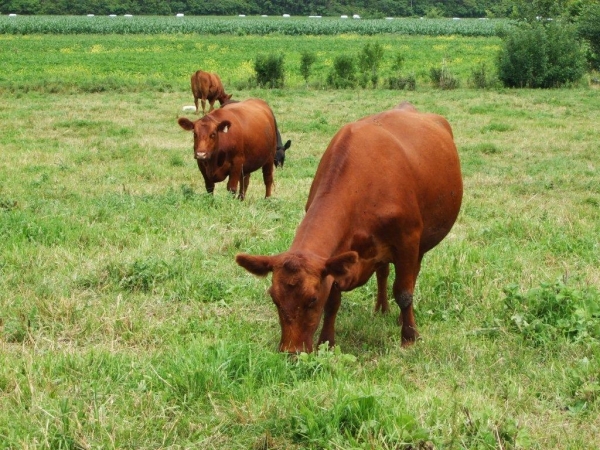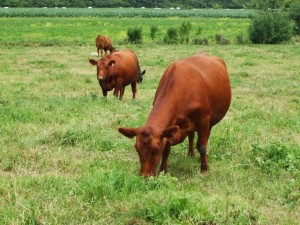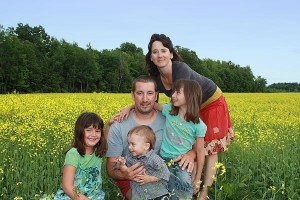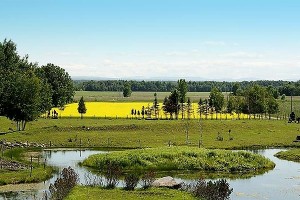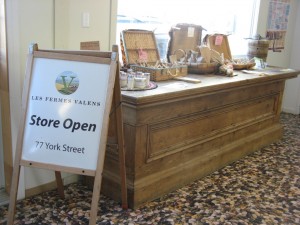 It was the last night of Markus Ritter’s B&B, when in walks David Lamb with an idea. Both being farmers, he asked if he’d like to sell organic beef in Montreal. The plan was to box up various cuts of beef, freeze it and sell it.
It was the last night of Markus Ritter’s B&B, when in walks David Lamb with an idea. Both being farmers, he asked if he’d like to sell organic beef in Montreal. The plan was to box up various cuts of beef, freeze it and sell it.
A few months later they began. They found an old furniture factory and renovated it into a butcher shop. Markus knew nothing about the butcher business. He had been a chef back in Austria, but that was the only end of food preparation he knew. This, however, did not dissuade him. He just learned what had to be learned.
“As a butcher shop we almost lost our shirts”.
The problem was no one was buying. The “if we make it, people will come” doesn’t always go as planned. One of the problems they encountered was that many families in the city don’t have an extra freezer to store large amounts of meat. With markets and stores at every corner, families can buy as they eat, and not have the need for storage. The other part of the problem was getting the word out to the right customers.
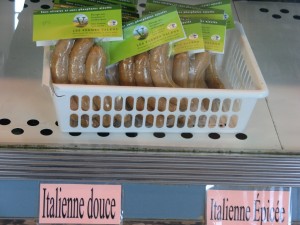 Searching for new ideas, Markus went home one day, got out his sausage maker and started experimenting with European-style sausages. After a successful tasting party, he brought some to a few stores. They sold, and then ordered some more. He’s on his fourth sausage maker, the latest version is a hi-tech computerized version that makes a perfect sausage – a far cry from his little hand-cranked one he started from.
Searching for new ideas, Markus went home one day, got out his sausage maker and started experimenting with European-style sausages. After a successful tasting party, he brought some to a few stores. They sold, and then ordered some more. He’s on his fourth sausage maker, the latest version is a hi-tech computerized version that makes a perfect sausage – a far cry from his little hand-cranked one he started from.
Along with the sausages, they began introducing beef, pork, veal, and lamb, in single serving packages. At the beginning Markus spent more time on the road than in the shop, getting out to customers and promoting their product. One of the keys to their success was that Markus would go out and ask people what they wanted. And then the company would make it for them. An important lesson for any entrepreneur: making sure to give the customers what they want, and not what you think they want. The meat comes mainly from the farms of the four partners that make up Fermes Valens: Markus, Archie Blanker, David Lamb and Doug McColm. When more is needed they call out to about 30 other local family farms in the area, mainly certified organic.
“Valens” means healthy in Latin, and is the underlying current and focus of the company. From the products they sell (organic when possible, and if not, then no pesticides, antibiotics or hormones and pasture-raised meats) to the work environment: all of the now 12 employees work either 3 or 4 days a week, in order to have time with their family.
“The hams that last 5 weeks in your fridge from the grocery – I wouldn’t even know how to make that stuff.”
Markus spent those first years behind the sausage maker, then in the last two years he’s moved onto research and development. He tests out new products, but is mindful not to stretch things too far or himself too thin. Markus is the innovator and businessman, running the Valens on the day-to-day activities. He has his own farm as well, with 50 Angus cattle, sunflowers, flax and canola (his wife makes organic oils that are sold through Valens), chickens, turkeys and other grains.
All four of the owners have beef, veal and lamb, but they each have their specialty as well.
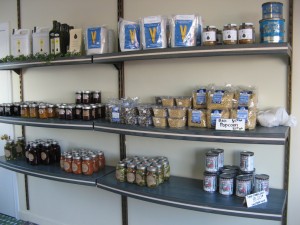 Archie Blanker is the “organic” guy of the bunch. He’s been doing it since the ‘90s and has the experience to share with the others.
Archie Blanker is the “organic” guy of the bunch. He’s been doing it since the ‘90s and has the experience to share with the others.
David Lamb has an organic flour mill –Valgrain – which Valens also sells.
Doug McColm is a 16th generation farmer, concentrating on cash crops.
There is a nice balance between the partners, Doug and Markus bring in the youthful daring and innovation, which is tempered with Archie and David’s age and experience.
“There is a way of earning a living with organic”
In 2005 when they began, organic was a tough sell. Prices weren’t really established in the market, and customers weren’t quite ready to pay the price. Now the customer base has grown, as well as customer awareness.
As the company grew, Fermes Valens made it a point to keep it local and to serve the local community. They could have started serving the large supermarkets, but decided to remain focused on the smaller stores and markets, continuing to use small local farms as producers, and keep local residents as employees.
They’ve come a long way from their first delivery van, which they had to push down the street to get it started, a portable freezer loaded in the back. Going the organic route is hard work, and it has taken several small markets for them to stay afloat. But it’s been worth it. From working seven days a week, including nights at his B & B, now Markus works four days a week at the office, is home every evening and weekends. He might still be working, but it’s on the farm with much more quality time with his family.
You can find Fermes Valens products at many health food stores in Montreal and throughout Quebec. For a full list, click here. You can also order online, visit www.fermesvalens.com, or visit them Saturdays at the Saint-Anne’s market in Sainte-Anne-de-Bellevue. If you have kids, try their little Frankfurters. My kids love them, and it’s a great healthy alternative to conventional hot dogs. I also love their half ham with its subtle smoky flavor. All of their products are 100% gluten free.
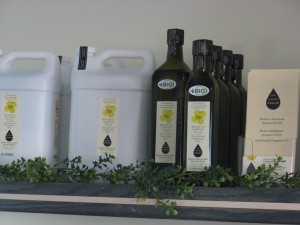 Along with their meats, they also have fresh eggs and organic eggs, free range and organic chickens, honey, and cold-pressed organic oils. They also have organic local maple syrup!
Along with their meats, they also have fresh eggs and organic eggs, free range and organic chickens, honey, and cold-pressed organic oils. They also have organic local maple syrup!
This post is also available in: French

